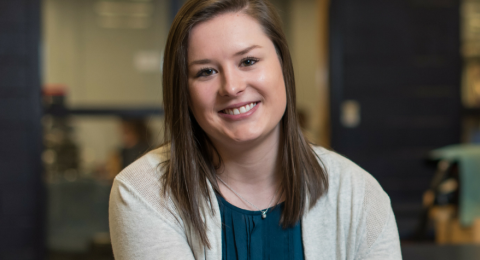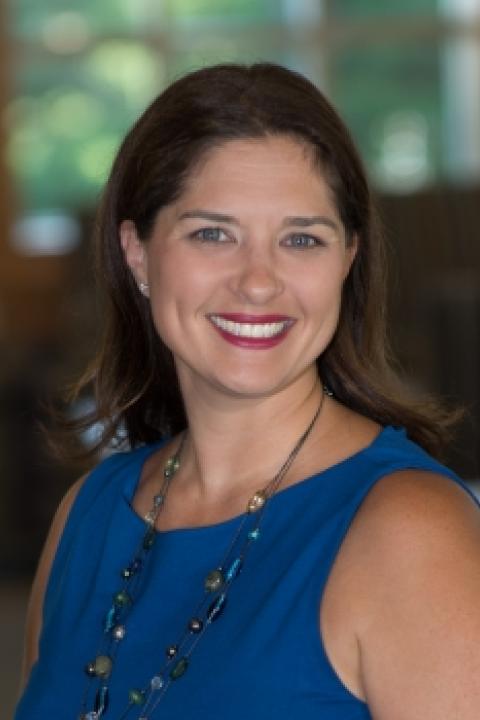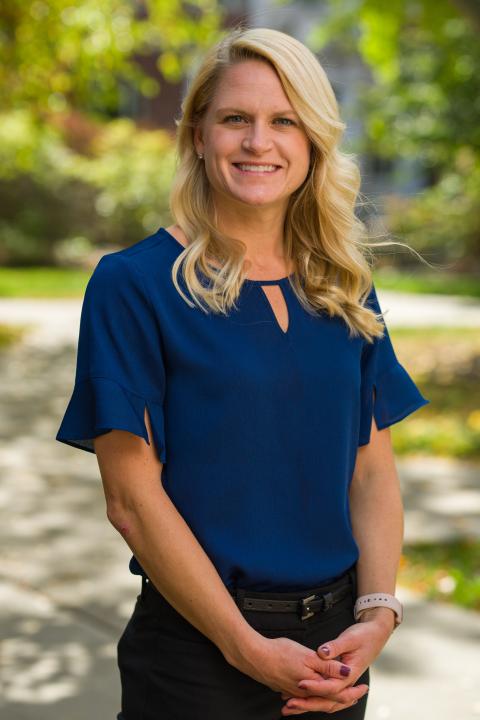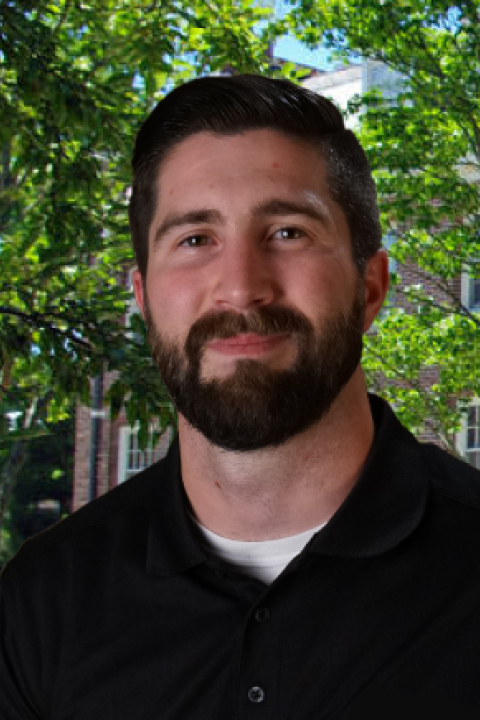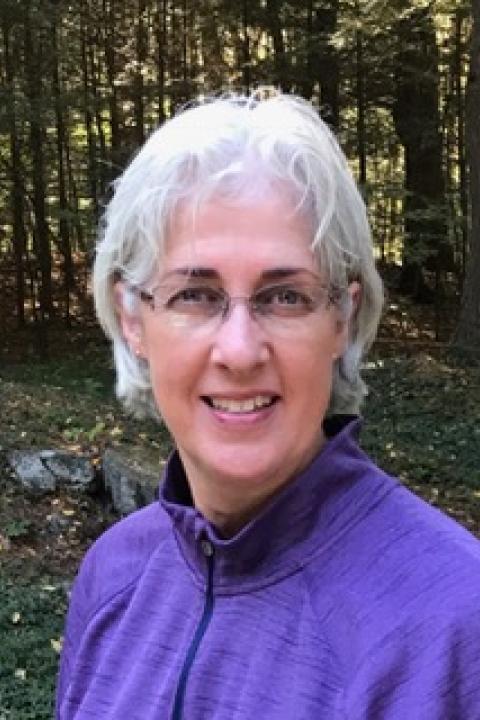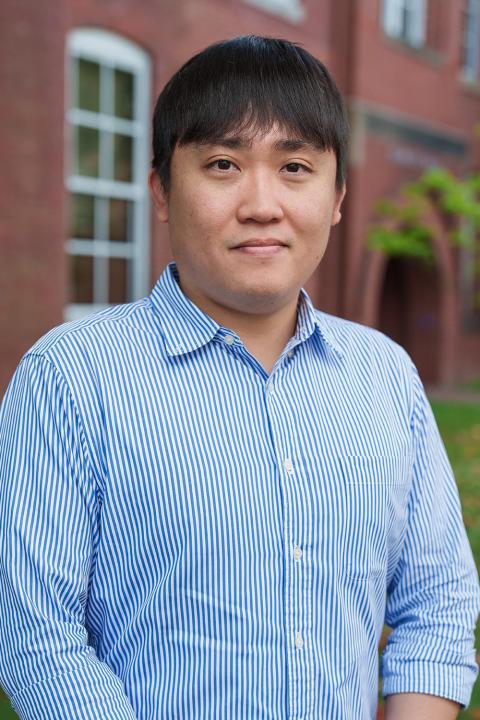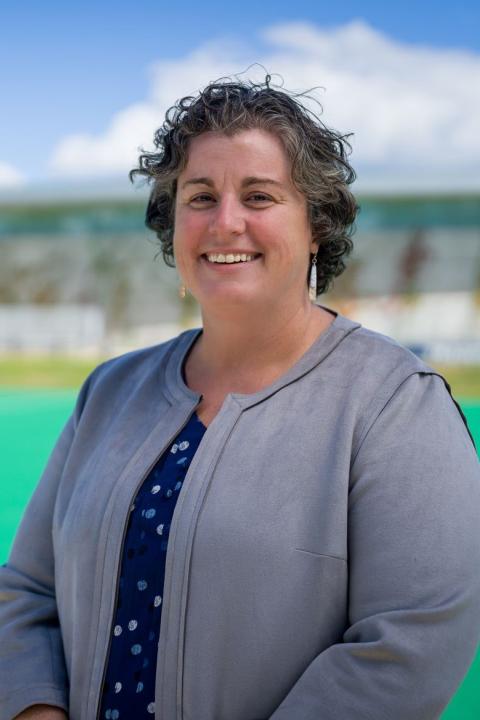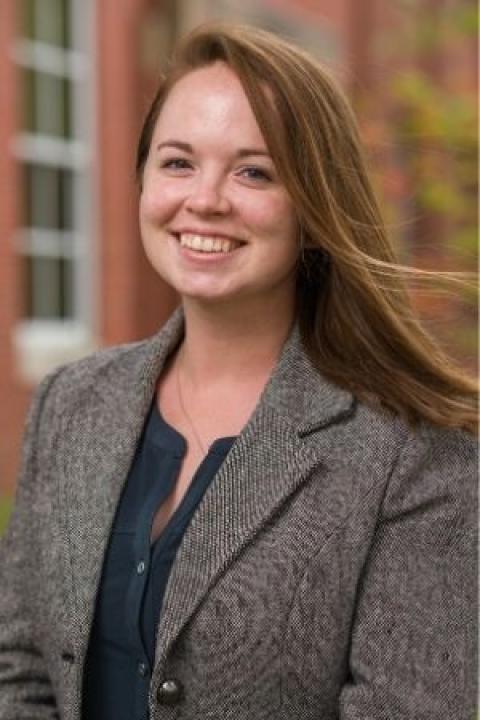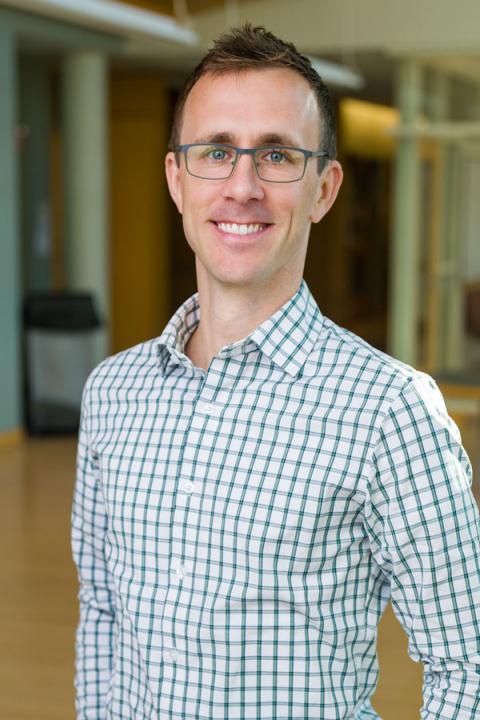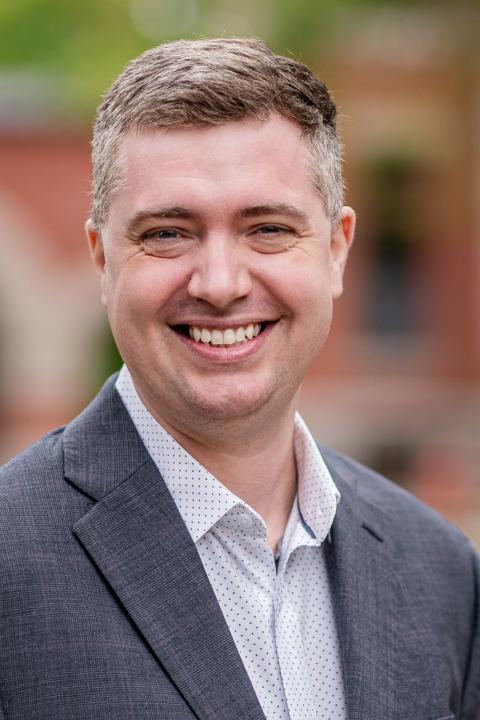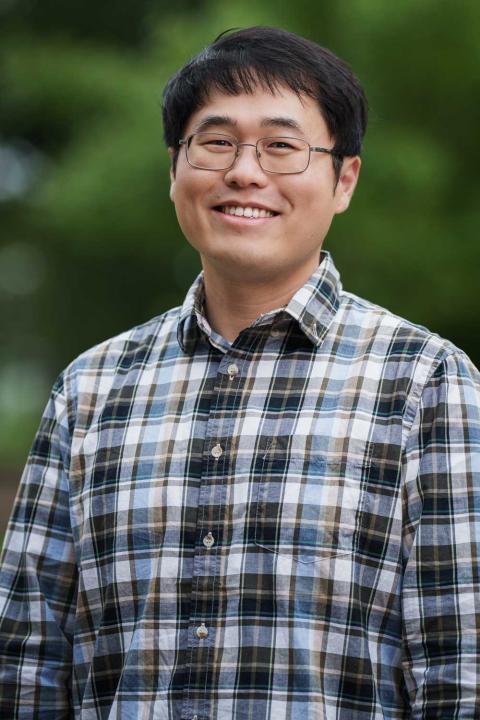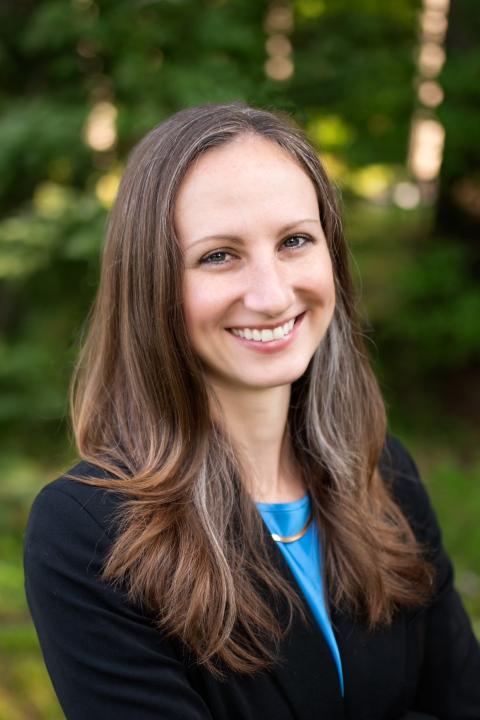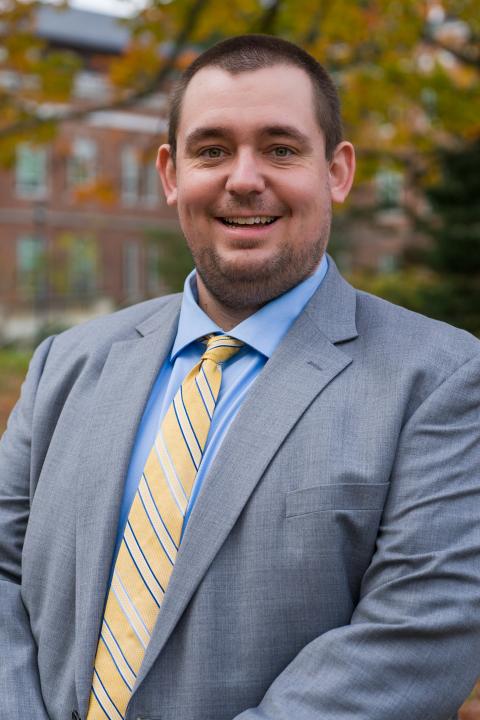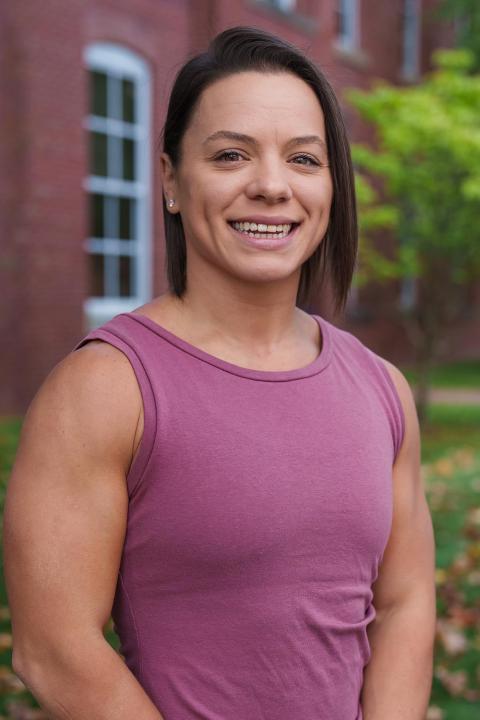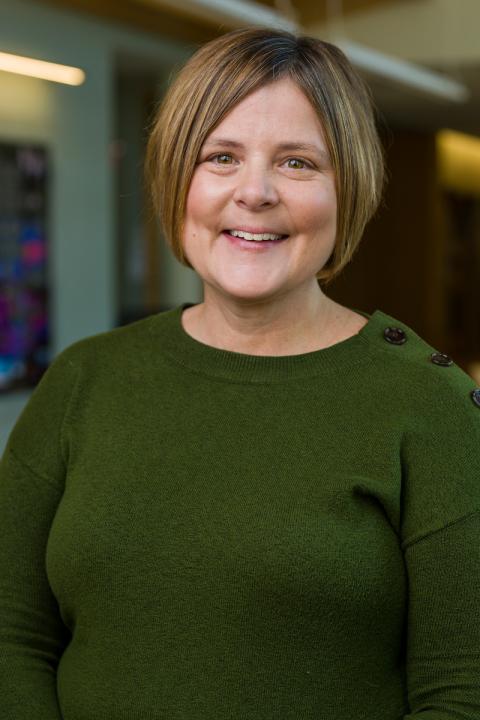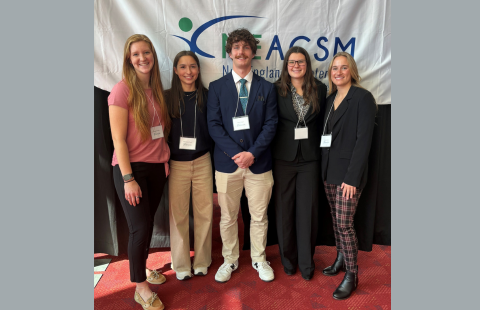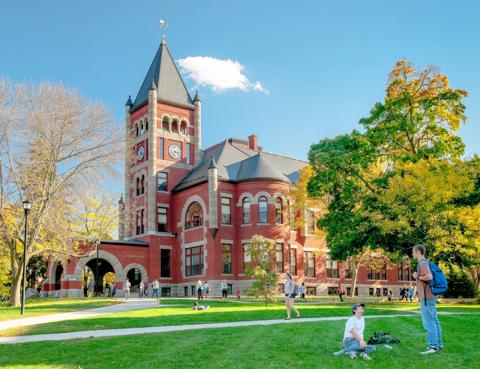WHY GET YOUR MASTER’S DEGREE IN KINESIOLOGY?
At UNH, a master’s degree in kinesiology allows you to choose among two specialization areas: exercise science or sport studies. Each area focuses on applying cutting-edge knowledge to practice and will prepare you to take the next career step in healthcare, sport administration or advanced research.
WHY CHOOSE UNH’S KINESIOLOGY PROGRAM?
UNH’s kinesiology graduate faculty are recognized leaders in their fields. The program emphasizes both classroom learning and hands-on learning in the lab and the field. You will graduate from the program prepared with the leadership skills and confidence needed to succeed in the workplace and emerge as a leader in your chosen area.
POTENTIAL CAREERS
- Academic instructor/professor
- Athletic administrator
- Clinical exercise physiologist
- Intercollegiate coach
- Sport marketing and business analyst
- Strength and conditioning coach
Curriculum & Requirements
The Department of Kinesiology offers a degree with the following areas of concentration: exercise science, and sport studies.
Exercise Science Concentration:
The MS in Kinesiology: Exercise Science prepares individuals for advanced careers in health and fitness promotion and education programs in hospitals, sports medicine centers, wellness clinics, universities, and rehabilitation facilities. Students are also prepared for terminal degree programs in the health professions, basic biology fields, medicine, or other health-related fields.
Sport Studies Concentration:
The Kinesiology Sport Studies graduate program focuses on preparing professionals in youth, interscholastic, intercollegiate programs and elite sport agencies to provide extraordinary sport experiences. Providing an understanding of the theoretical and practical knowledge and skills within the context of sport is essential in developing sport professionals at UNH. Our curriculum provides a framework of coursework, and the flexibility to focus preparation on careers in coaching or administration or additional graduate study in sport psychology. In addition, students have opportunities for applied experience and research with faculty. The graduate program in Kinesiology: Sport Studies engages students in learning experiences in the classroom, in applied settings, and in research. The focus on a theory-to-practice approach is infused throughout the curriculum with the goal that our students will be well prepared professionals as they enter the workforce or further graduate study.
Degree Requirements
All degree candidates will be required to complete courses listed in the Masters Degree Core, the designated concentration core, and electives as required in order to meet the 30-credit minimum necessary for graduation. In addition to coursework, students follow either the thesis, the non-thesis, or the advanced research plan as described below.
| Code | Title | Credits |
|---|---|---|
| Master's Degree Core Course | ||
| Select one of the following graduate statistics courses or equivalent: | ||
| EDUC 881 | Introduction to Statistics: Inquiry, Analysis, and Decision Making | 4 |
| SW 962 | Data Analysis and Statistics | 3 |
| Code | Title | Credits |
|---|---|---|
| Exercise Science Concentration | ||
| KIN 870 | Research Methods in Kinesiology | 4 |
| KIN 896 | Advanced Research in Exercise Science | 6 |
| KIN 902 | Colloquium (may be repeated once for a total of 4 credits) | 1-2 |
| Elective Courses | ||
| Additional elective courses are selected in consultation with academic advisor to meet the 30-credit minimum necessary for graduation. | ||
| KIN 804 | Electrocardiography | 4 |
| KIN 805 | Topics in Applied Physiology | 4 |
| KIN 806 | Neurology | 4 |
| KIN 820 | Science and Practice of Strength Training | 4 |
| KIN 822 | Applied Biomechanics | 4 |
| KIN 824 | Exercise Metabolism: Acute and Chronic Adaptations | 4 |
| KIN 894 | Cardiopulmonary Pathologies | 4 |
| Code | Title | Credits |
|---|---|---|
| Sport Studies Concentration | ||
| KIN 870 | Research Methods in Kinesiology | 4 |
| Select three courses from the following: | 12 | |
KIN 840 | Athletic Administration | |
KIN 841 | Social Issues in Contemporary Sports | |
KIN 864 | Advanced Sport Marketing | |
KIN 865 | Advanced Topics in Coaching | |
KIN 880 | Psychological Factors in Sport | |
| Elective Courses | ||
| Two additional elective courses are selected in consultation with academic advisor to meet the 30-credit minimum necessary for graduation. | ||
Thesis Plan
A minimum of 30 approved graduate credits, including a thesis (24 graduate course credits plus 6 credits of KIN 899 Master's Thesis), as well as an oral defense of the thesis, are required in the thesis plan.
Non-Thesis Plan
A minimum of eight approved graduate courses (with a minimum of 30 credits) are required in the non-thesis plan. Four credits of KIN 895 Advanced Studies are required. A student may begin taking KIN 895 Advanced Studies only after completing at least three approved graduate courses.
Advanced Research Plan
Exercise science students who elect this plan must take a total of 6 credits of KIN 896 Advanced Research in Exercise Science. In addition, exercise science students must orally present their research to faculty and peers.
Program Learning Outcomes
- Demonstrates mastery of major theories, approaches, concepts, and both current and classical theoretical findings within their selected field of study.
- Compiles and critiques current peer-reviewed research, practice of industry standards, and theoretical foundations to produce a paper or project of publishable quality that enhances existing knowledge or creates new knowledge in a specific area within the option.
- Demonstrates proficiency and mastery of specific skills within the profession, which is grounded in evidence-based practice.
- Displays professionally appropriate behaviors, ethical standards, sensitivity, compassion, tolerance of individual differences, and demonstrates the ability to work in a diverse and interprofessional work environment.
Deadlines
Applications must be completed by the following deadlines in order to be reviewed for admission:
- Fall: April 1 (recommended US; final international); July 1 (final)
- Spring: Dec. 1
- Summer: N/A
- Special: N/A
Application fee: $65
Campus: Durham
New England Regional: VT
Accelerated Masters Eligible: No
New Hampshire Residents
Students claiming in-state residency must also submit a Proof of Residence Form. This form is not required to complete your application, but you will need to submit it after you are offered admission, or you will not be able to register for classes.
Transcripts
If you attended UNH or Granite State College (GSC) after September 1, 1991, and have indicated so on your online application, we will retrieve your transcript internally; this includes UNH-Durham, UNH-Manchester, UNH Non-Degree work and GSC.
If you did not attend UNH, or attended prior to September 1, 1991, then you must upload a copy (PDF) of your transcript in the application form. International transcripts must be translated into English.
If admitted, you must then request an official transcript be sent directly to our office from the Registrar's Office of each college/university attended. We accept transcripts both electronically and in hard copy:
- Electronic Transcripts: Please have your institution send the transcript directly to grad.school@unh.edu. Please note that we can only accept copies sent directly from the institution.
- Paper Transcripts: Please send hard copies of transcripts to: UNH Graduate School, Thompson Hall- 105 Main Street, Durham, NH 03824. You may request transcripts be sent to us directly from the institution or you may send them yourself as long as they remain sealed in the original university envelope.
Transcripts from all previous post-secondary institutions must be submitted and applicants must disclose any previous academic or disciplinary sanctions that resulted in their temporary or permanent separation from a previous post-secondary institution. If it is found that previous academic or disciplinary separations were not disclosed, applicants may face denial and admitted students may face dismissal from their academic program.
Letters of recommendation: 3 required
Recommendation letters submitted by relatives or friends, as well as letters older than one year, will not be accepted.
In addition, if applying to the Exercise Science or Sports Studies option, at least two of the letters must come from professors that you took classes from at your undergraduate institution.
Personal Statement/Essay Questions
Prepare a brief but careful personal statement regarding: 1) reasons you wish to do graduate work in this field, including your immediate and long-range objectives, and 2) your specific research or professional interest and experiences in this field.
Exercise Science: Applicants to the Exercise Science M.S. program should provide a 500 word maximum statement pertaining to how their research interests align with current faculty interests. This research interests statement should be included as part of your personal statement in your application and is to aid in aligning prospective students with faculty mentors. Please review the Exercise Science faculty and research web pages and review faculty publications. It is also appropriate for you to contact the faculty member/s you are interested in studying with via email or phone for more information about their current research.
Statements must be included with your submitted application.
Important Notes
All applicants are encouraged to contact programs directly to discuss program-specific application questions.
International Applicants
Prospective international students are required to submit TOEFL, IELTS, or equivalent examination scores. English Language Exams may be waived if English is your first language. If you wish to request a waiver, then please visit our Test Scores webpage for more information.
Explore Program Details
Exercise Science Graduate Assistantships
A limited number of graduate assistantships are available each academic year. These assistantships are highly competitive and are awarded to meritorious students exhibiting skill sets that coincide with exercise science option & faculty needs. Graduate assistants carry a full academic load (6-12 credits per semester) and are expected to contribute 20 hours per week in the area that the assistantship is held. The areas are typically associated with: a) clinical programs; b) laboratory research; or c) teaching. Graduate assistantships are for one year with possible renewal the second year depending on performance and funding availability. In order to be considered for a graduate assistantship, go to the application link below and fill out and send in (email, FAX, or regular postal mail) the application by the due date. Late applications are generally not considered.
Application for Graduate Assistantship
Sport Studies Graduate Assistantship
The Sport Studies Graduate Assistant position will be housed in the Sport Studies program within the Department of Kinesiology. Duties will be determined based on placement and could include, but are not limited to, conducting/assisting in research, preparing projects, assisting undergraduate classes, and managing the Sport Management and Leadership Lab. The GA’s tasks will focus on promoting Women’s Sport and/or addressing Gender Equity in Sport. Graduate assistants are expected to work 20 hours per week in these ventures and will be compensated through a tuition waiver (in-state or out-of-state) and a yearly stipend in alignment with the current rate for UNH graduate assistants.
